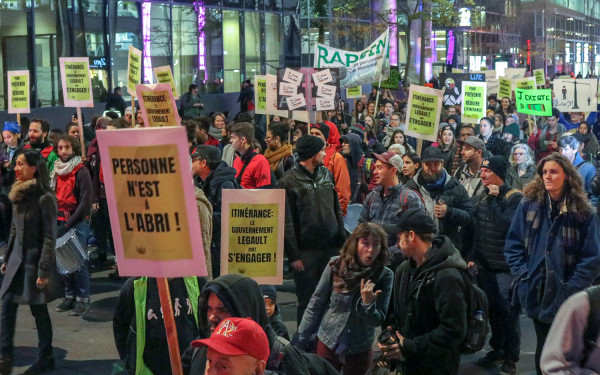Love, Not Tears, For Those Lost
Hundreds Gather for Annual Women’s Memorial March in Montreal
Sub-zero temperatures and Valentine’s Day weren’t enough to stop hundreds from marching in Montreal at the 25th Annual Women’s Memorial March on Saturday.
The objective each year is to commemorate the lives of missing and murdered women. Thousands gathered across the country to show support, in cities such as Ottawa, Vancouver, Winnipeg, Toronto, Calgary, Saskatoon and Edmonton.
“Don’t be scared to laugh because it’s a celebration, not a funeral. It’s a time to celebrate for our women and hold them up,” said John Cree, a Kahnawake elder.
Before the march, Cree recited a prayer to the gathering of allies. Organizers and members of different associations, such as Missing Justice and the Native Women’s Shelter of Montreal, also made speeches.
“This February march, unlike the Oct. 4 march, is actually for women of all backgrounds, but there’s a heavy emphasis on Native women,” said Maya Rolbin-Ghanie, the publicity coordinator at Concordia’s Centre for Gender Advocacy, who was one of the organizers of the march.
According to the solidarity collective Missing Justice, Indigenous women in Canada are at least five times more likely than other women living here to die as a result of violence.
The official number of cases of missing and murdered Indigenous women is over 1,181 since 1980, according to the Native Women’s Association of Canada and the RCMP, though many activists say the number is closer to 3,000. Currently, there are 225 unsolved cases of either missing or murdered Native women.
Unlike earlier years, the march did not begin in Cabot Square but beside it. The square is a well-known hangout for the homeless population, many of whom happen to be Native people, and is currently closed for a multi-million-dollar renovation.
“This square has had a huge impact on that community as well as for the outreach workers that worked in that area,” said Rolbin-Ghanie.
The march began at the same time as the one held in Vancouver, which was significant as the march was founded in Vancouver in 1991, organizers announced to the crowd. This was Montreal’s sixth annual march.
The peaceful crowd of hundreds marched on Ste. Catherine Street, chanting and carrying banners alongside the rhythm of drums. People listened to the chanting and the music when the crowd stopped in front of Concordia University.
An inquiry into missing and murdered Aboriginal women is a priority for activists, and it’s a demand that has thus far gone unheard by the federal government. “We Demand An Inquiry” was only one of the many phrases on banners people held.
Rolbin-Ghanie added that it is important the marches happen in as many places as possible. “[Sending that] message to the public in general, as well showing our government that people think it’s important enough to go out [for],” Rolbin-Ghanie said.

_900_600_90.jpg)


1_600_375_90_s_c1.jpg)
_(1)_600_375_90_s_c1.jpg)
